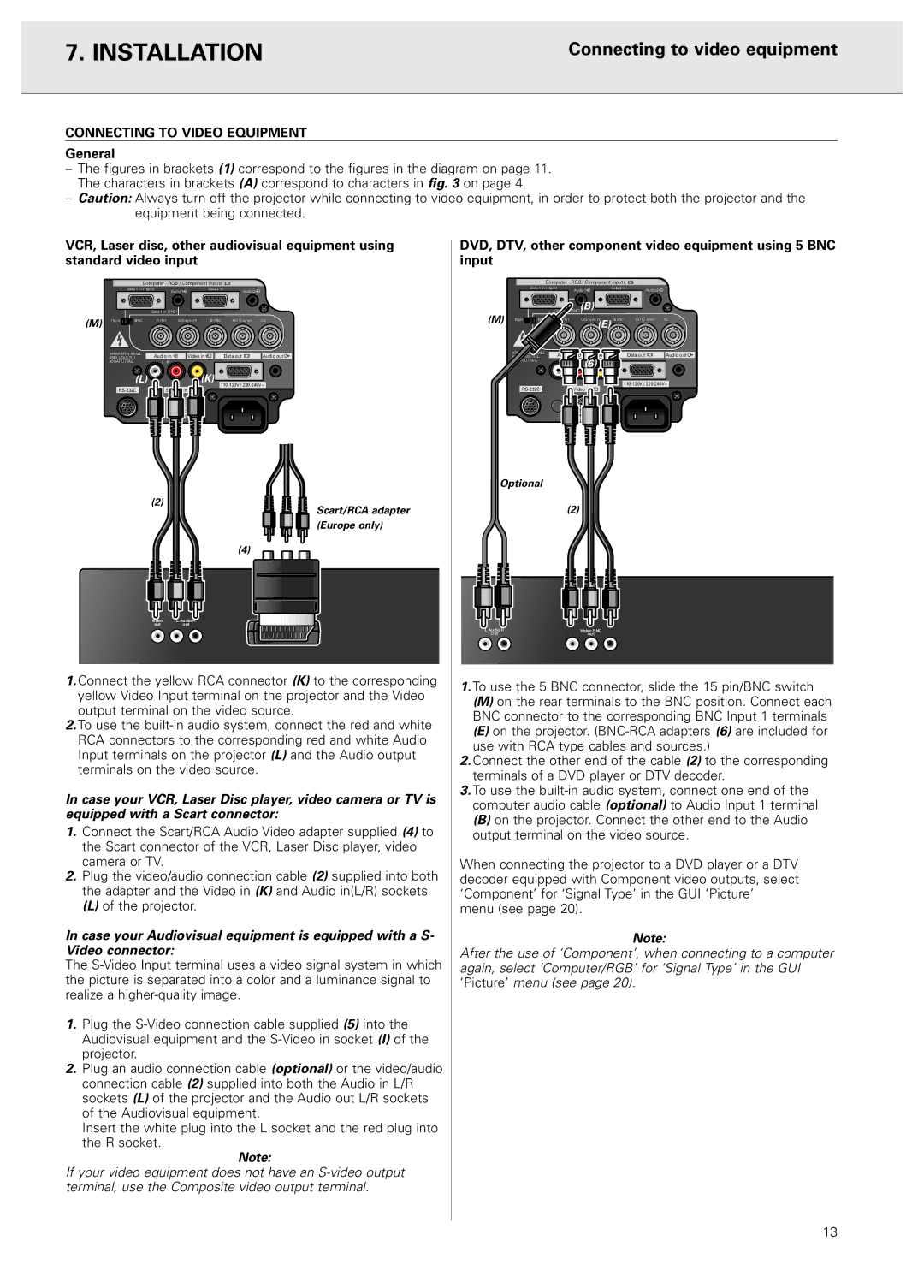
7. INSTALLATION | Connecting to video equipment |
|
|
CONNECTING TO VIDEO EQUIPMENT
General
–The figures in brackets (1) correspond to the figures in the diagram on page 11. The characters in brackets (A) correspond to characters in fig. 3 on page 4.
–Caution: Always turn off the projector while connecting to video equipment, in order to protect both the projector and the equipment being connected.
VCR, Laser disc, other audiovisual equipment using | DVD, DTV, other component video equipment using 5 BNC |
standard video input | input |
Computer - RGB / Component inputs |
| Computer - RGB / Component inputs |
| ||||
Data 1 in (15pin) | Audio1 | Data 2 in | Audio2 | Data 1 in (15pin) | Audio1 | Data 2 in | Audio2 |
|
|
|
| ||||
Data 1 in (BNC) |
|
| Data 1 in (BNC)(B) |
|
| ||
(M) | 15pin | BNC | R (Pr) G/G sync (Y) B (Pb) HD (C sync) VD | (M) 15pin | BNC | R (Pr) G/G sync (Y) B (Pb) HD (C sync) VD |
|
|
|
|
| (E) |
APPARATEN SKALL | Audio in | Video in | Data out | Audio out | APPARATEN SKALL | Audio in | Video in | Data out | Audio out |
ANSLUTAS TILL | ANSLUTAS TILL |
| (6) |
|
| ||||
JODAT UTTAG. | L R |
|
|
| JODAT UTTAG. | L R |
|
| |
|
|
|
|
|
|
|
|
| |
(L) |
| (K) |
|
|
| ||||
| |||||||||
|
|
|
|
| |||||
| Optional |
(2) | (2) |
Scart/RCA adapter | |
(Europe only) |
|
(4) |
|
Video | L Audio R |
|
out | out |
|
| L Audio R | Videoi eo BNC |
| out | outt |
1. Connect the yellow RCA connector (K) to the corresponding | 1. To use the 5 BNC connector, slide the 15 pin/BNC switch | |
yellow Video Input terminal on the projector and the Video | ||
(M) on the rear terminals to the BNC position. Connect each | ||
output terminal on the video source. | ||
BNC connector to the corresponding BNC Input 1 terminals | ||
2. To use the | ||
(E) on the projector. | ||
RCA connectors to the corresponding red and white Audio | ||
use with RCA type cables and sources.) | ||
Input terminals on the projector (L) and the Audio output | ||
2. Connect the other end of the cable (2) to the corresponding | ||
terminals on the video source. | ||
terminals of a DVD player or DTV decoder. | ||
| ||
In case your VCR, Laser Disc player, video camera or TV is | 3. To use the | |
computer audio cable (optional) to Audio Input 1 terminal | ||
equipped with a Scart connector: | ||
(B) on the projector. Connect the other end to the Audio | ||
1. Connect the Scart/RCA Audio Video adapter supplied (4) to | ||
output terminal on the video source. | ||
the Scart connector of the VCR, Laser Disc player, video |
| |
camera or TV. | When connecting the projector to a DVD player or a DTV | |
2. Plug the video/audio connection cable (2) supplied into both | decoder equipped with Component video outputs, select | |
the adapter and the Video in (K) and Audio in(L/R) sockets | ‘Component’ for ‘Signal Type’ in the GUI ‘Picture’ | |
(L) of the projector. | menu (see page 20). | |
In case your Audiovisual equipment is equipped with a S- | Note: | |
Video connector: | After the use of ‘Component’, when connecting to a computer | |
The | again, select ‘Computer/RGB’ for ‘Signal Type’ in the GUI | |
the picture is separated into a color and a luminance signal to | ‘Picture’ menu (see page 20). | |
realize a |
|
1.Plug the
2.Plug an audio connection cable (optional) or the video/audio connection cable (2) supplied into both the Audio in L/R sockets (L) of the projector and the Audio out L/R sockets of the Audiovisual equipment.
Insert the white plug into the L socket and the red plug into the R socket.
Note:
If your video equipment does not have an
13
